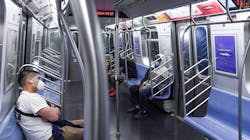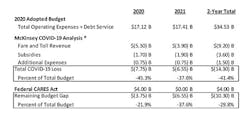New York Metropolitan Transportation Authority (MTA) is sounding the alarm about the potential for financial disaster should it not receive additional federal funding support to shore up the losses experienced as a result of the COVID-19 pandemic.
This isn’t the first time MTA has used the term “financial calamity” to describe its situation. In mid-March, MTA Chairman and CEO Patrick Foye requested a total of $4 billion in financial assistance – $3.7 billion to cover revenue losses and $300 million annualized to cover added COVID-19 expenses. The authority was awarded the $4 billion through the Coronavirus Aid, Relief and Economic Security (CARES) Act, but that number turned out to be a gross underestimate of what the pandemic has done to MTA’s budget. The results of an economic study released in mid-April pegged MTA’s total losses due to the pandemic between $7 billion and $8.5 billion.
"The MTA is facing unprecedented fiscal challenges stemming from this global pandemic, the likes of which we have never seen even in the 70s, 80s and the financial crisis of 2008," said Foye.
On June 24, MTA said subway ridership surpassed 19 percent and bus ridership surpassed 50 percent of normal pre-pandemic numbers. Ridership was down as much as 90 percent on some lines during the state of New York’s stay-at-home period. To ensure employees and riders remain safe while using the system, MTA has implemented an aggressive disinfecting and cleaning routine that includes shutting down the subway at night, testing the use of ultraviolet light and increased cleaning of high-touch surfaces, as well as the issuance of personal protective equipment (PPE) to employees and temperature checks.
“The system is cleaner than ever,” New York Gov. Andrew Cuomo said during a June 24 press conference. “I defy anyone to find a time when the subways have been cleaner…Forget cleaning, they are literally disinfected and that is a positive that has come out of this and I applaud the MTA for doing this. To disinfect the subway was not a simple task.”
MTA expects its direct COVID-related expenses will reach $500 million by the end of 2020, with increased cleaning accounting for most of that expense and a smaller portion being spent on PPE and the authority’s Temperature Brigade.
"In order for us to provide New Yorkers with the service required to restart the regional and national economies and the modernized transit system they deserve, it is imperative that the federal government step up, do the right thing and invest in the system to the tune of at least an additional $3.9 billion now. The health of our city and region – and by extension our nation – depends on it," said Foye.
MTA made it clear that all options remain on the table should additional financial assistance not materialize.
“That includes, but is not limited to, wage freezes, delaying starting new capital projects or reducing the scope of the historic 2020-2024 Capital Program to modernize the transit system, non-personnel expense reductions, reductions in force, scheduled fare and toll increases, service reductions and long-term deficit financing. And deficit financing would require additional funding to cover the debt service associated with such borrowing. At this time, the awarding of new work in the Capital Program remains on hold, with the exception of a traunch of 2015-19 projects that are being accelerated to take advantage of the overnight closure and low ridership,” explained MTA.
There are a few pieces of legislation moving through Washington, D.C., that could deliver additional financial relief to the transit industry, including MTA.
The HEROES Act, which was sponsored by U.S. Rep. Nita Lowey (D-NY-17) and passed the House, includes $15.75 billion for the transit industry (MTA’s requested $3.9 billion included in this total), but where the CARES Act provided funding to a wide swath of the transit industry, the HEROES Act would limit the funding relief to larger agencies. MTA provides 40 percent of all transit rides in the U.S.
A second bill, the Investing in a New Vision for the Environment and Surface Transportation in America (INVEST in America) Act, which is a five-year surface transportation reauthorization proposal, passed out of committee last week and is expected to be considered by the full House in early July. The INVEST in America Act includes more than $100 billion over five years for the transit industry including COVID-related relief.
MTA explains this proposal does not meet its financial needs as the bill’s COVID assistance would provide MTA with about $900 million for all of FY 2021. The authority is currently drawing down $700-$800 million per month on its CARES funding. Additionally, MTA says the INVEST in America Act utilizes “flawed and outdated” federal funding formulas for transit agencies.
“The reality is that the MTA is facing financial peril," said MTA CFO Bob Foran. “If the Senate fails to follow the lead of the House of Representatives and neglects to deliver billions more in federal support, the MTA will be unable to operate at the level needed to keep New York's economy functioning where it needs to be to support the nation’s economy. The bottom line is that the financial health of the MTA is absolutely vital to the nation's economic recovery more broadly."
About the Author

Mischa Wanek-Libman
Group Editorial Director
Mischa Wanek-Libman is director of communications with Transdev North America. She has more than 20 years of experience working in the transportation industry covering construction projects, engineering challenges, transit and rail operations and best practices.
Wanek-Libman has held top editorial positions at freight rail and public transportation business-to-business publications including as editor-in-chief and editorial director of Mass Transit from 2018-2024. She has been recognized for editorial excellence through her individual work, as well as for collaborative content.
She is an active member of the American Public Transportation Association's Marketing and Communications Committee and served 14 years as a Board Observer on the National Railroad Construction and Maintenance Association (NRC) Board of Directors.
She is a graduate of Drake University in Des Moines, Iowa, where she earned a Bachelor of Arts degree in Journalism and Mass Communication.

